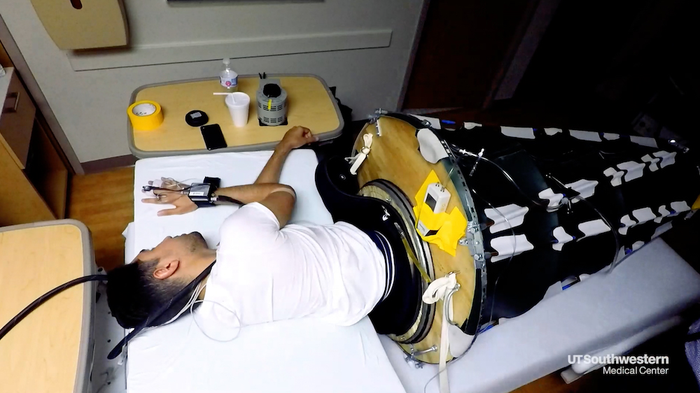Nasa could use strange sleeping bag to stop astronauts losing their sight in space

Nasa could use a strange sleeping bag to stop astronauts disastrously losing their sight during missions.
Journeys in space are hard on the eyes. Astronauts are hit by vision problems when fluids float into their head and squash the eyeball, pushing at it and reshaping it.
That could be even worse when astronauts take longer flights than those humanity has conducted already. “It would be a disaster if astronauts had such severe impairments that they couldn’t see what they’re doing and it compromised the mission,” said Benjamin Levine, who is working with Nasa to address the problem.
It remains one of the biggest problems with space travel, and a major fear for humans who might undertake long journeys further into space. Scientists have been grappling with it for more than a decade.
It has already caused problem for astronauts who have visited the International Space Station. Of those who have spent at least six months on the floating lab, more than half experienced eye problems – finding themselves far sighted, having trouble reading, or even being forced to ask colleagues for help with experiments.
Until now, the main response has been to give astronauts special glasses that can have their lenses adjusted to account for any problems with the eyes. But that does not mitigate any long-term effects, either on the eyeball or anything else – such as potential cardiovascular problems that have been found in previous research.
“And it’s certainly possible there are other effects of brain pressure we haven’t documented yet,” Dr Levine said. “The astronauts report something they call the ‘space stupids.’
“They make more mistakes than they think they should. Whether that has anything to do with the inability to lower the pressure, we don’t know.”
One solution could be the new sleeping bag, which takes pressure of the brain by pulling fluids into the lower body. Astronauts would sleep in the bag and hopefully keep their eyes safe from such reshaping.
The new sleeping bag was tested during a study on Earth which saw a volunteer lay in bed for three days. At night, he would be placed into the sealed sleeping bag to test it out.
The researchers found that just lying down for those three days, even on Earth, did reshape the eyeball slightly. But when the suction technology was used, there was no such effect.
The research emerged from years of experiments conducted to understand what happens to pressure in the brain when people are in space. One included recruiting cancer survivors who still had ports on their head from treatment, sending them on zero-gravity flights and then measuring the brain pressure.
That research found that brain pressure is actually higher when lying down on Earth than it is in space. But on the ground, the pressure is alleviated when people stand up – something that is not possible for astronauts.
The researchers behind the special sleeping bag think it might finally solve that problem, with only practical questions – such as how long astronauts need to spend in the bags – left to answer.
“This is perhaps one of the most mission-critical medical issues that has been discovered in the last decade for the space program,” Dr Levine said. “I’m thankful for the volunteers who are helping us understand, and hopefully, fix the problem.”
Join our commenting forum
Join thought-provoking conversations, follow other Independent readers and see their replies
0Comments